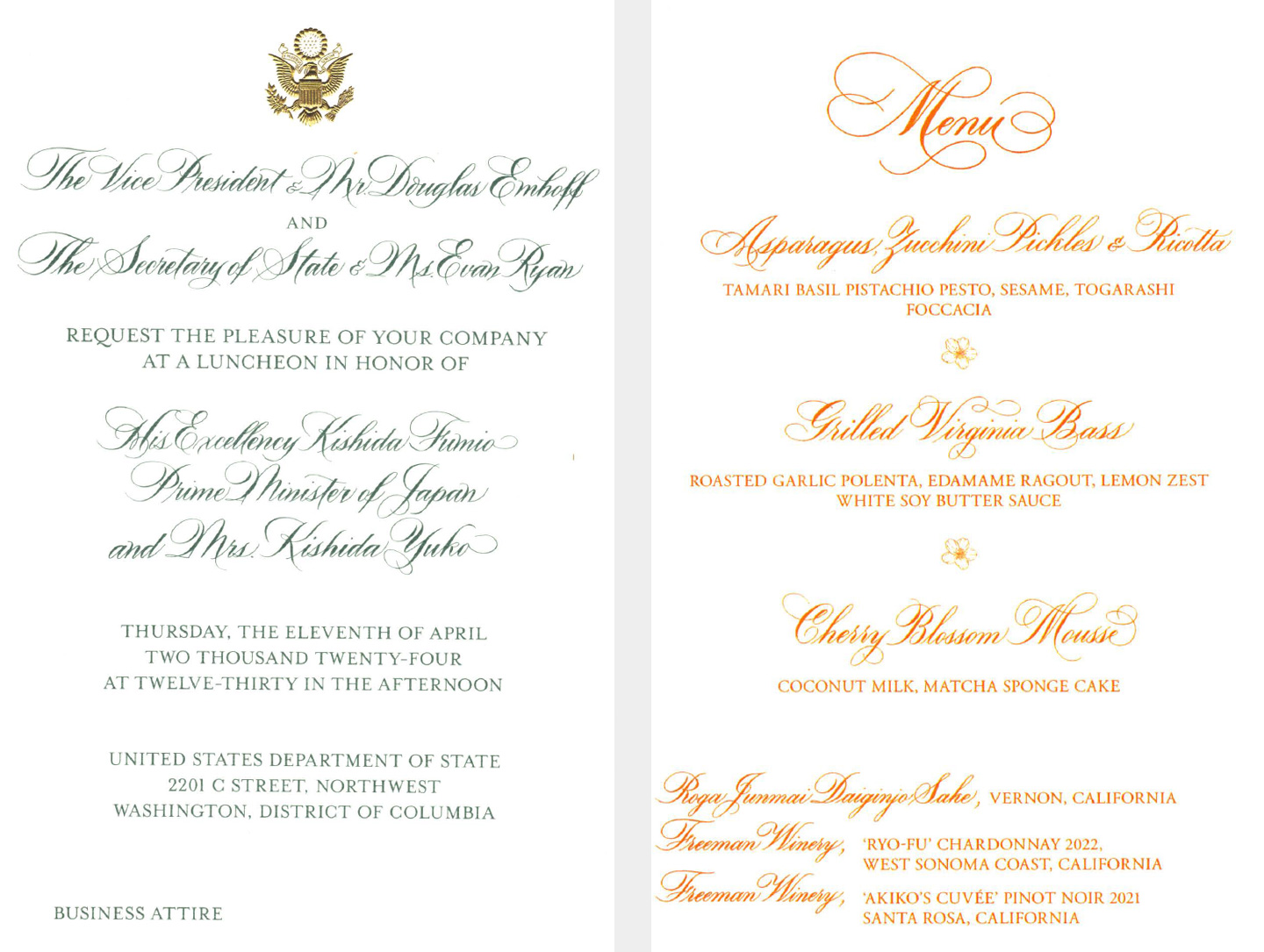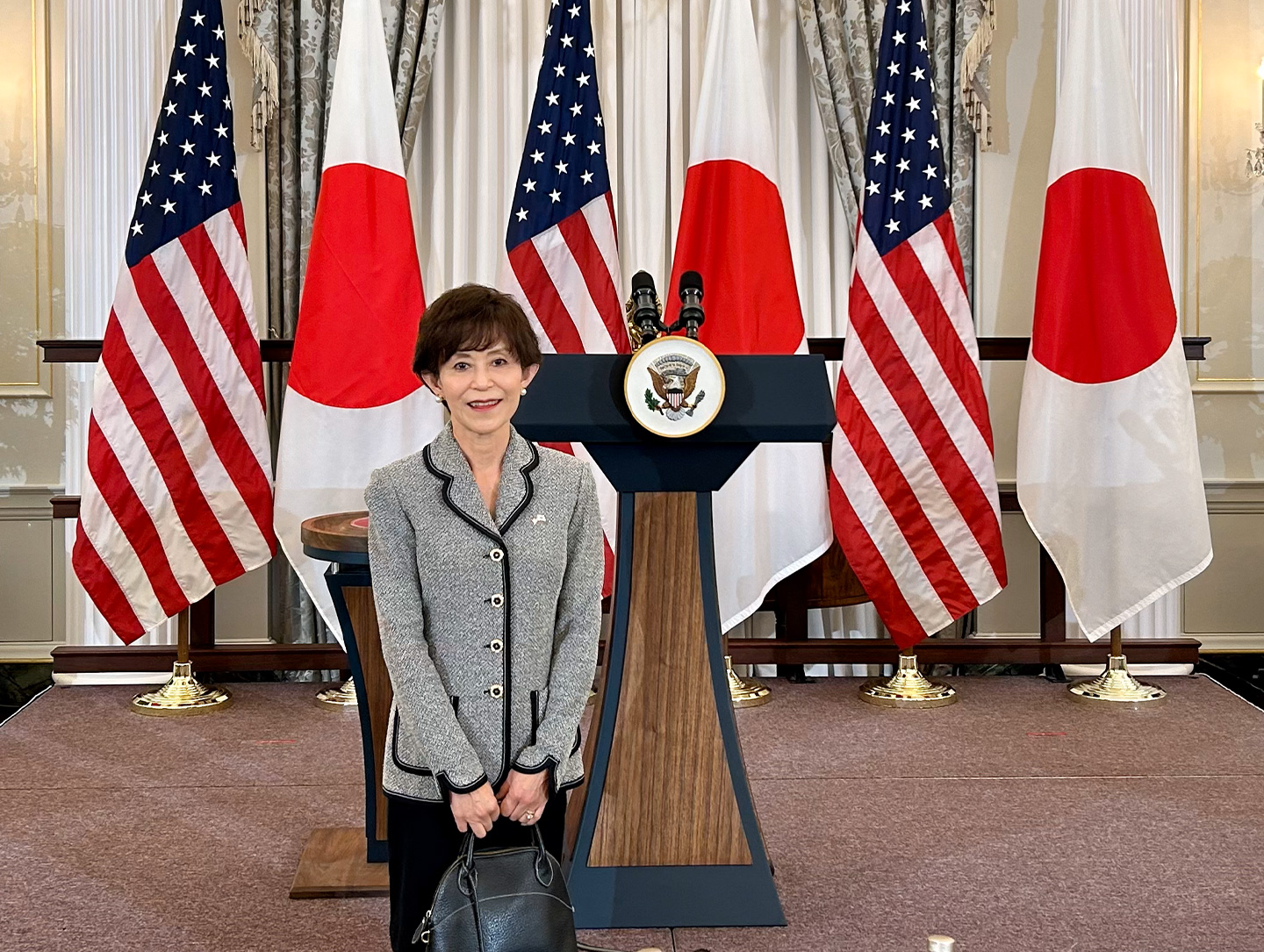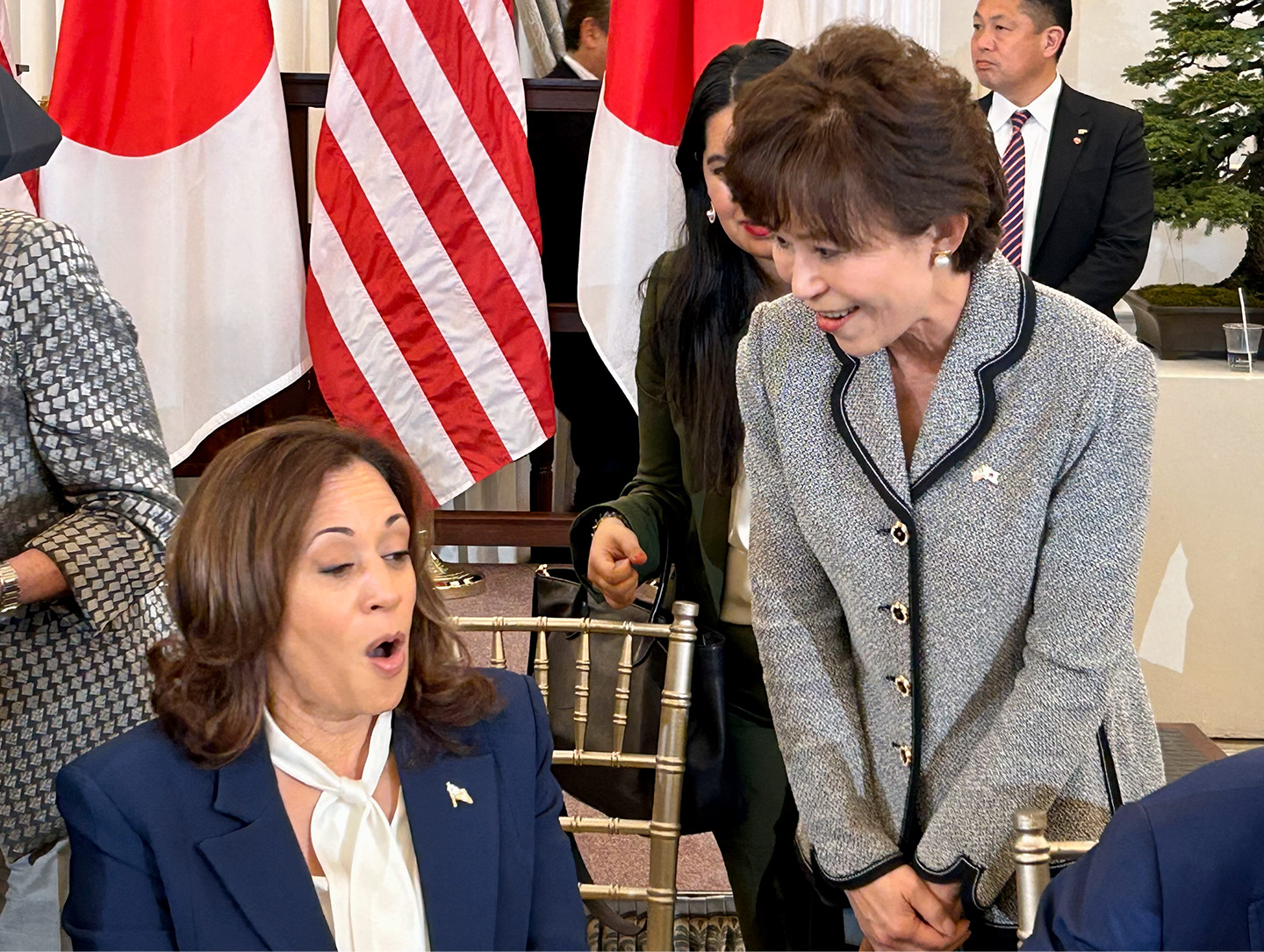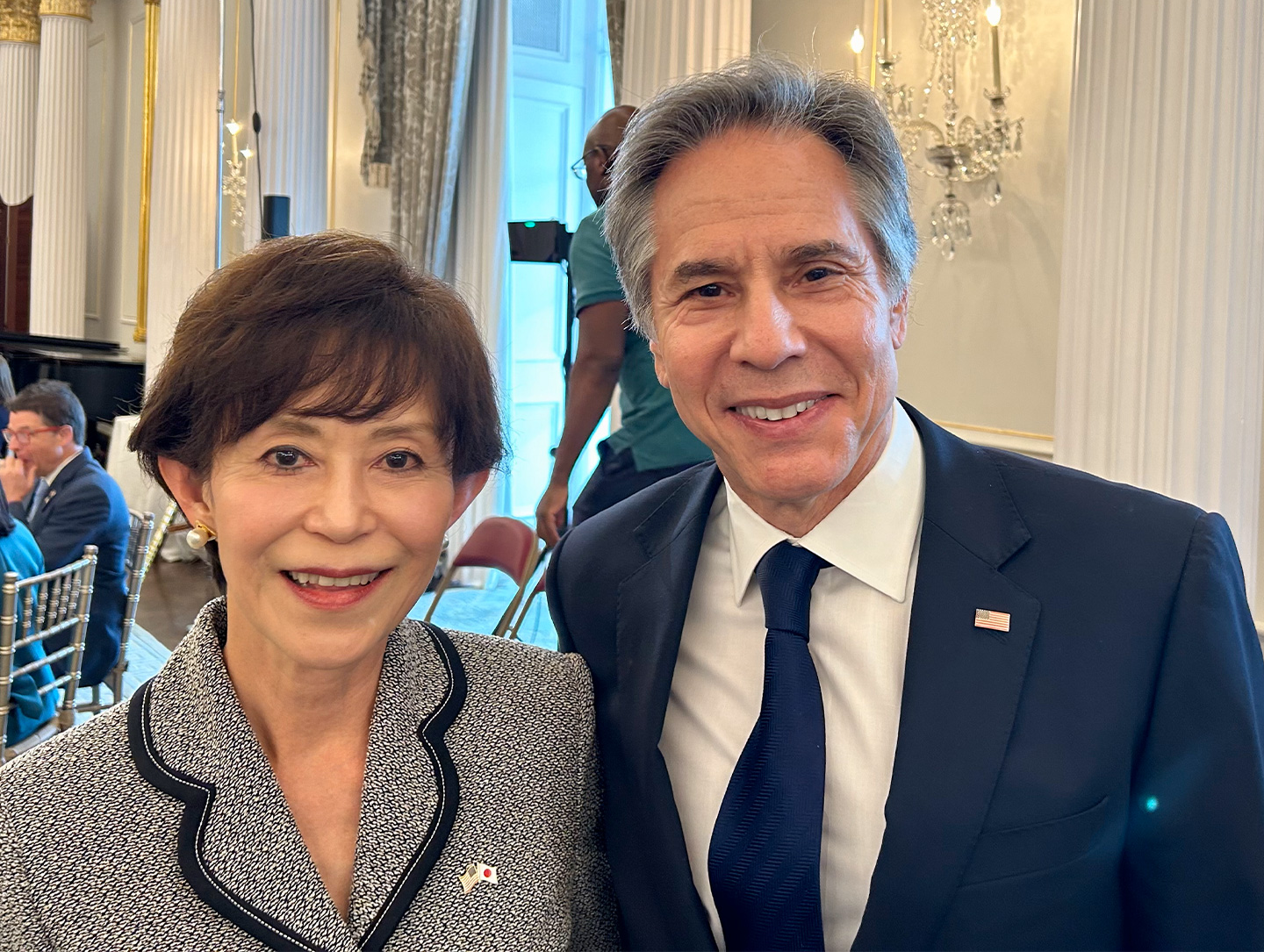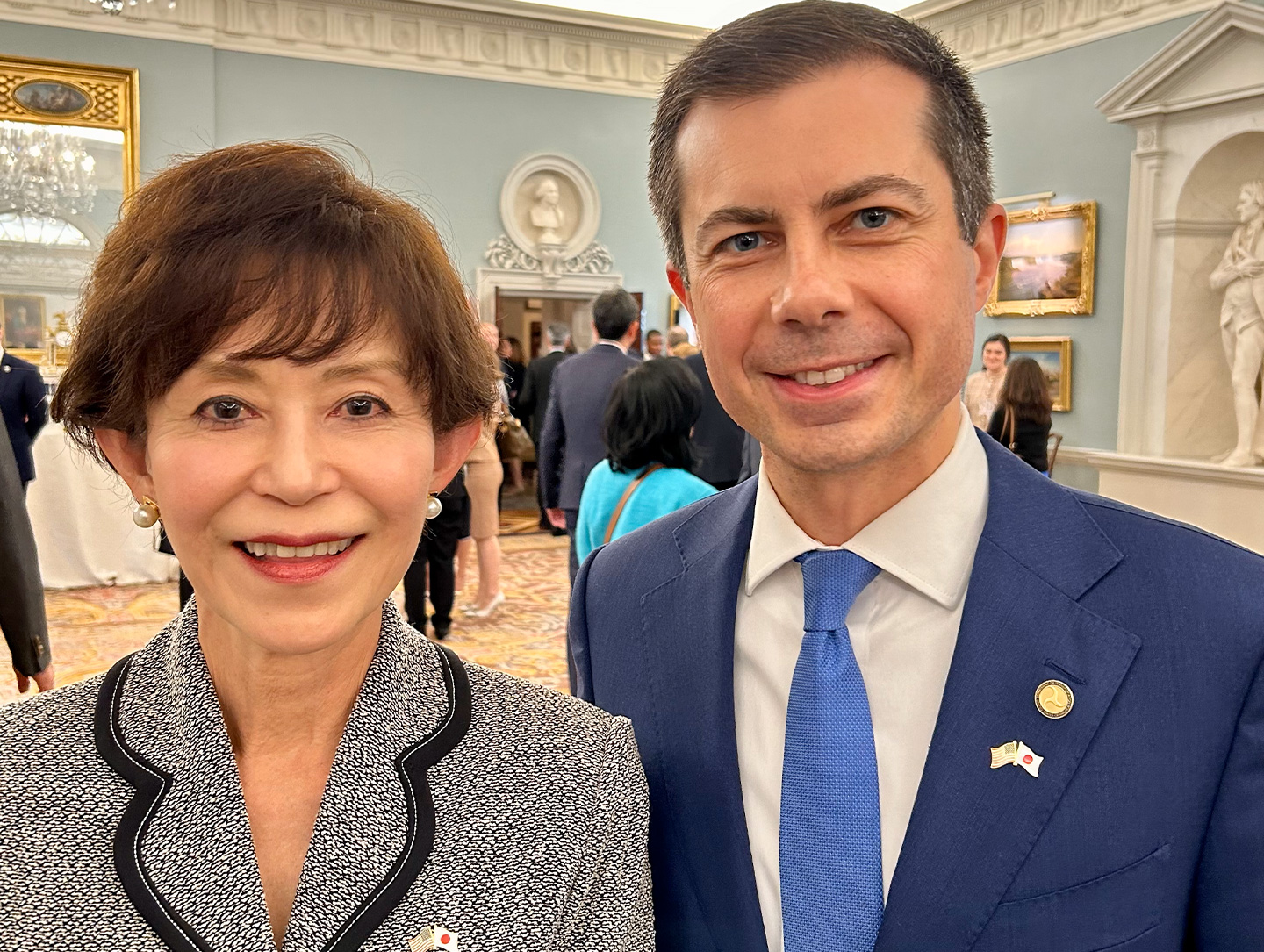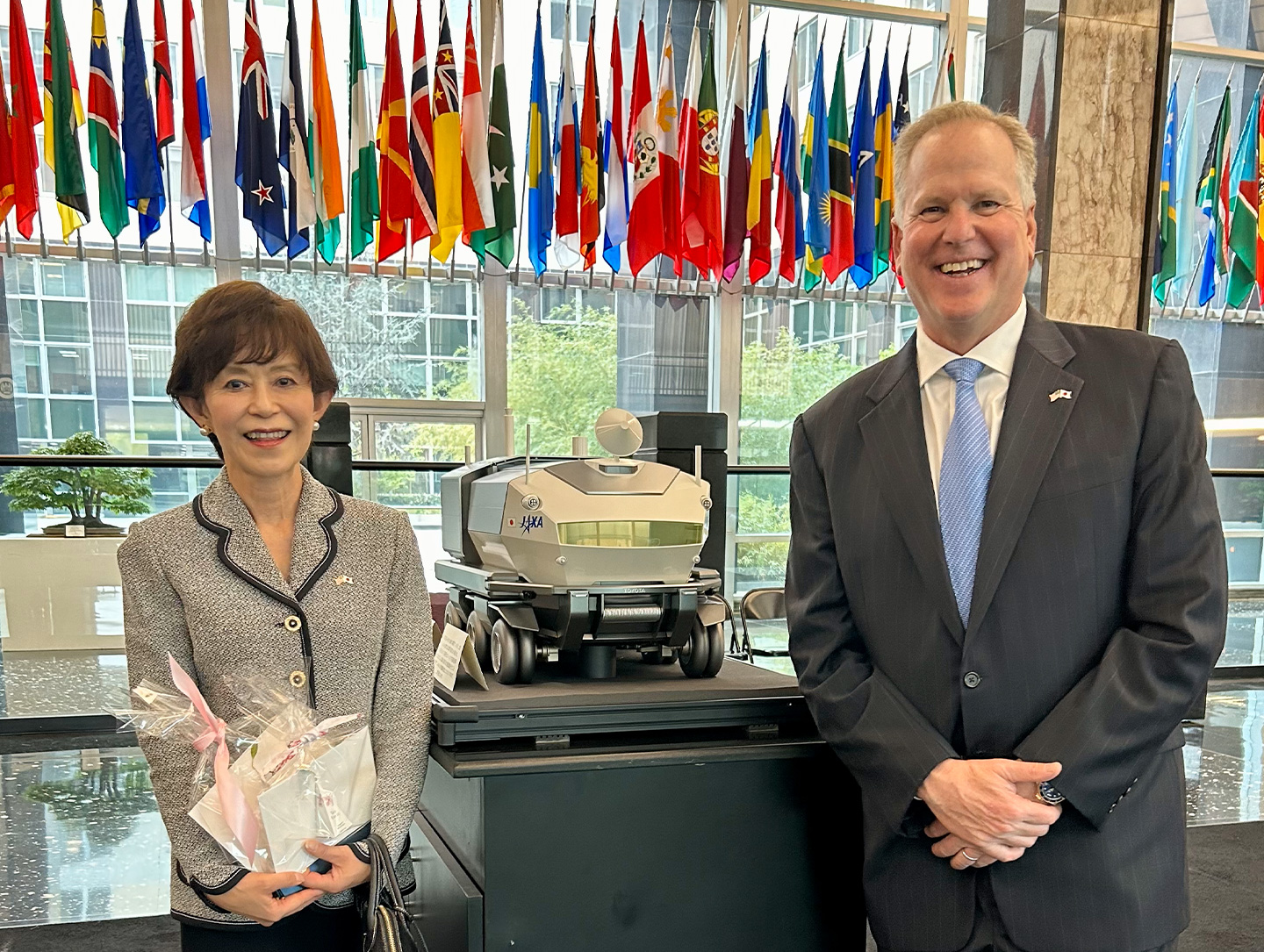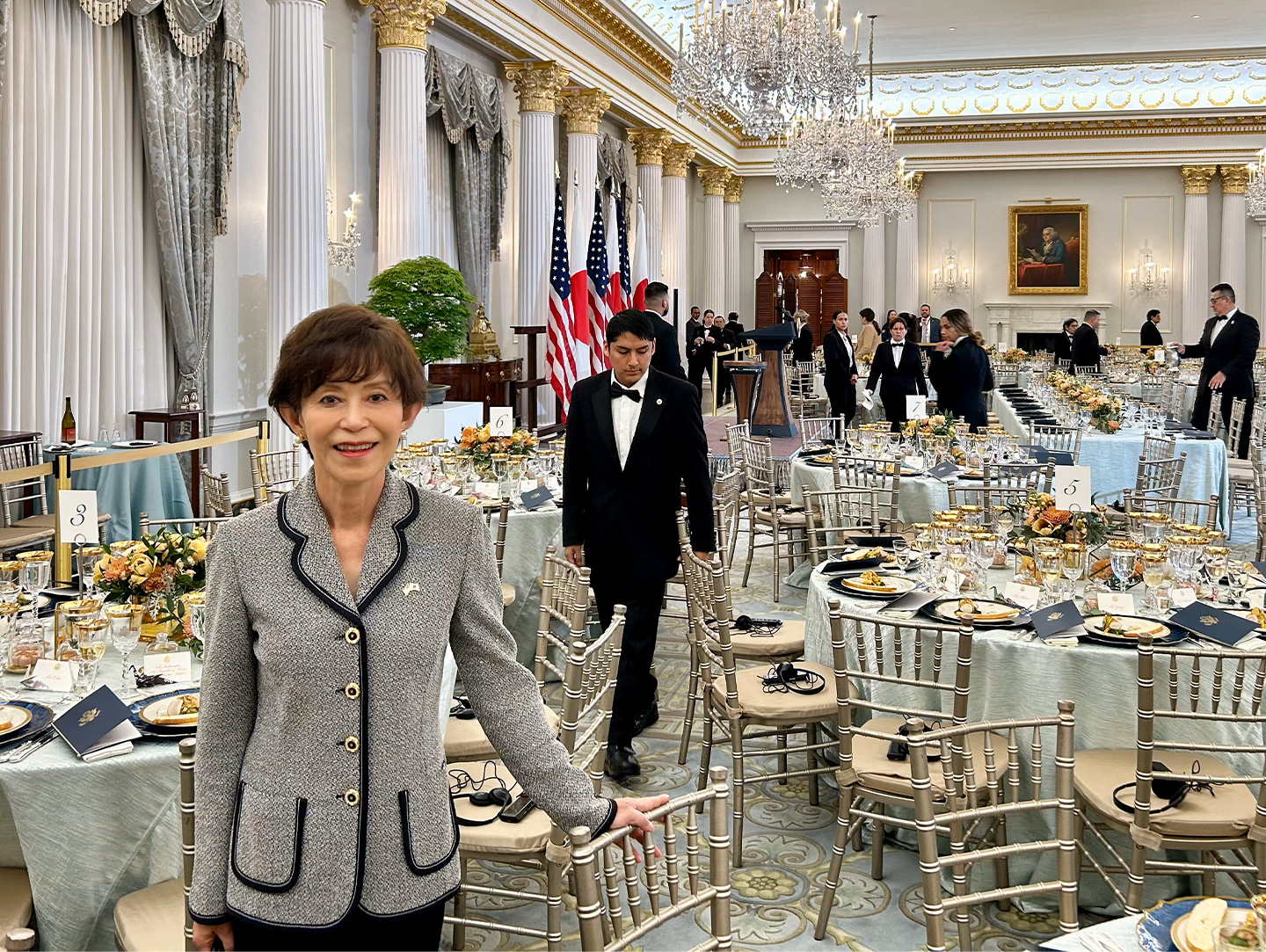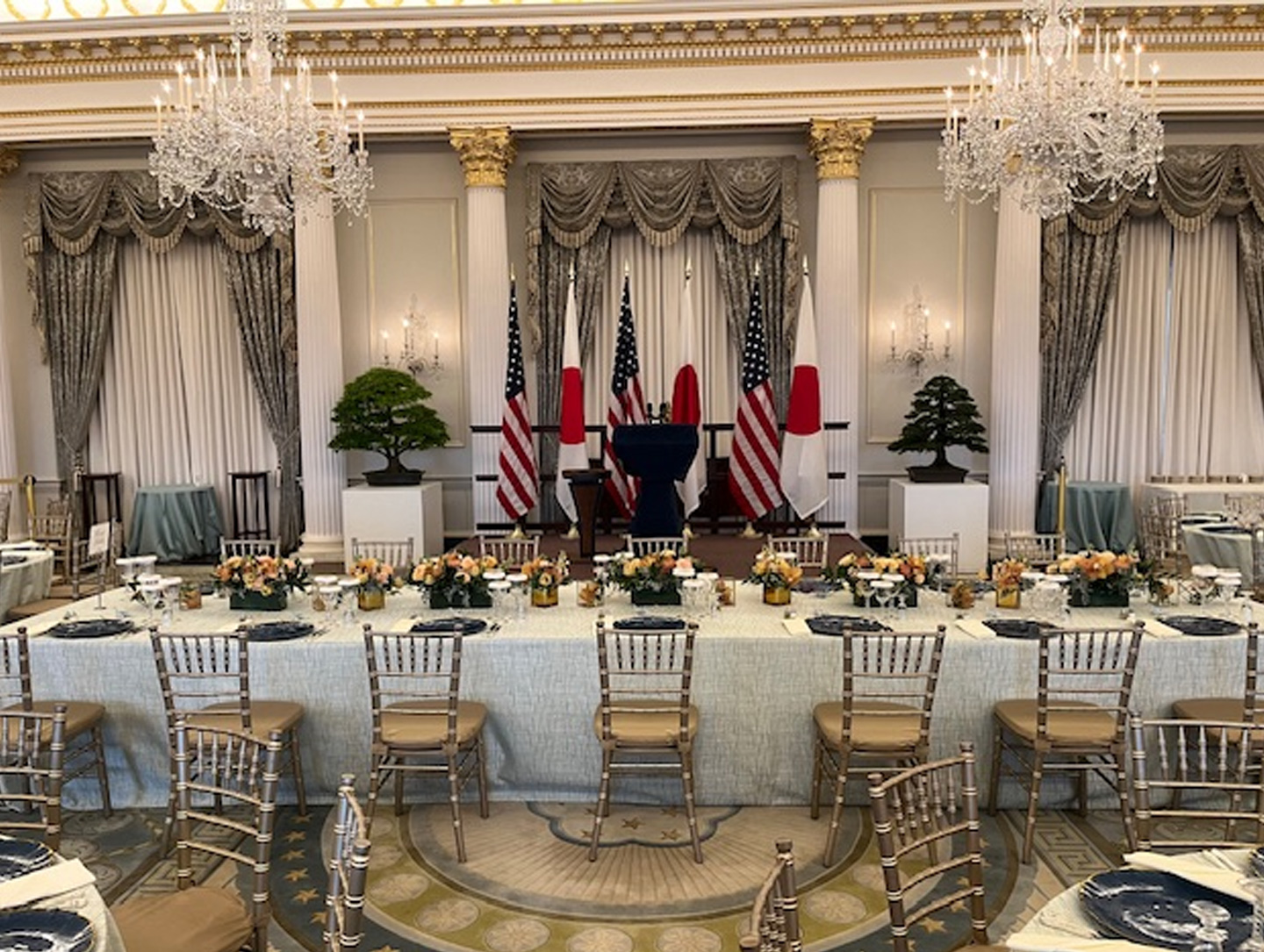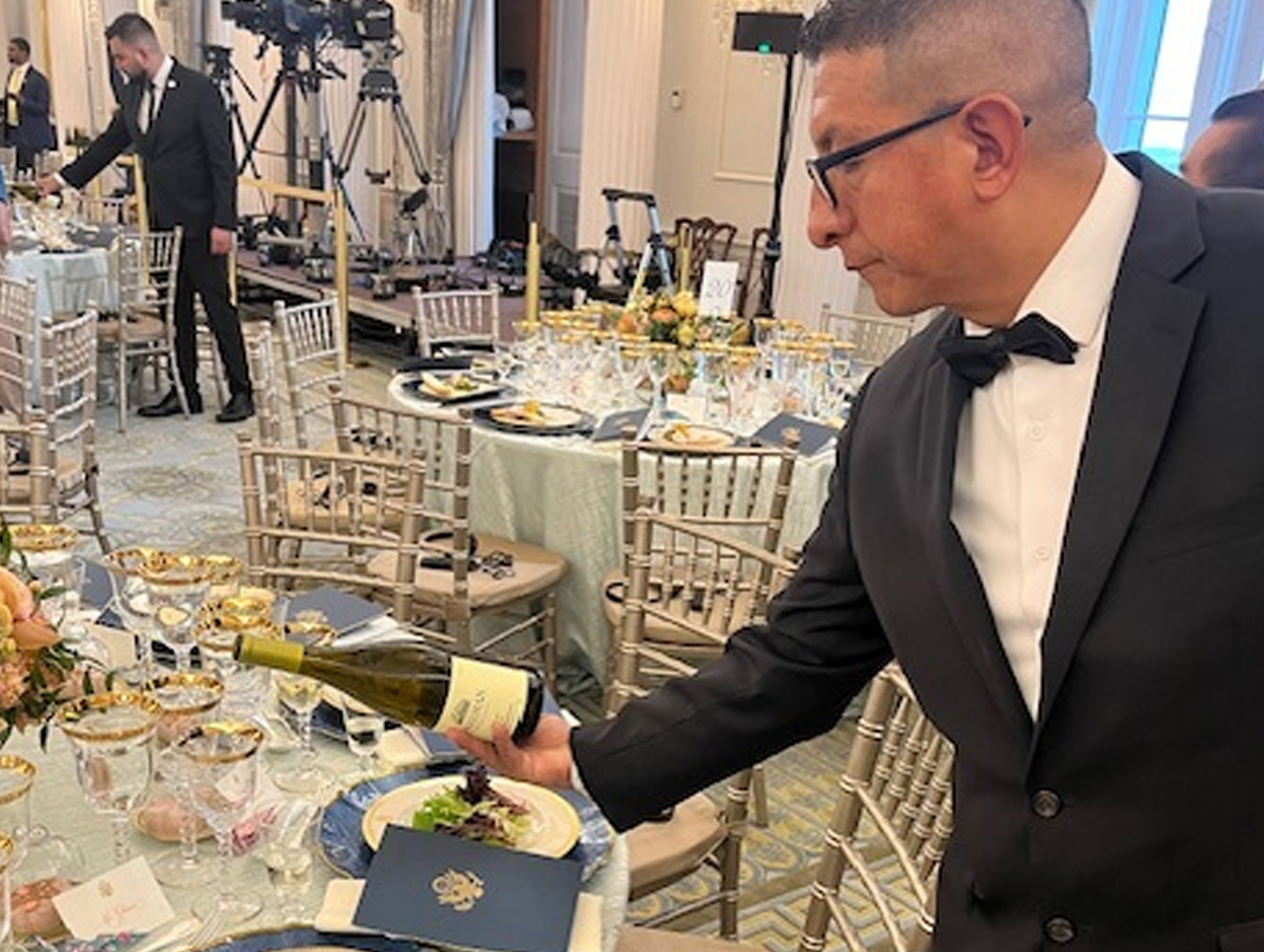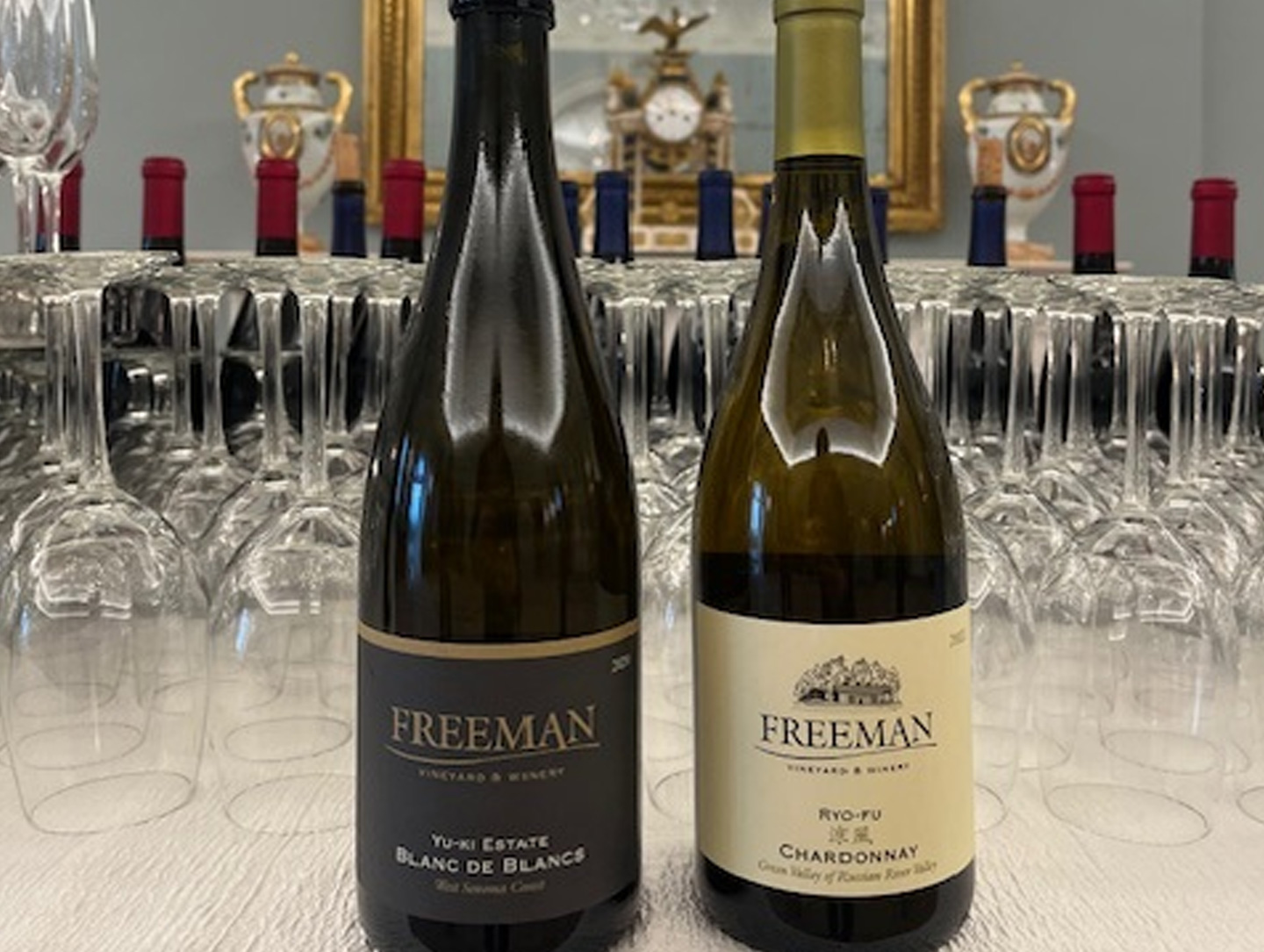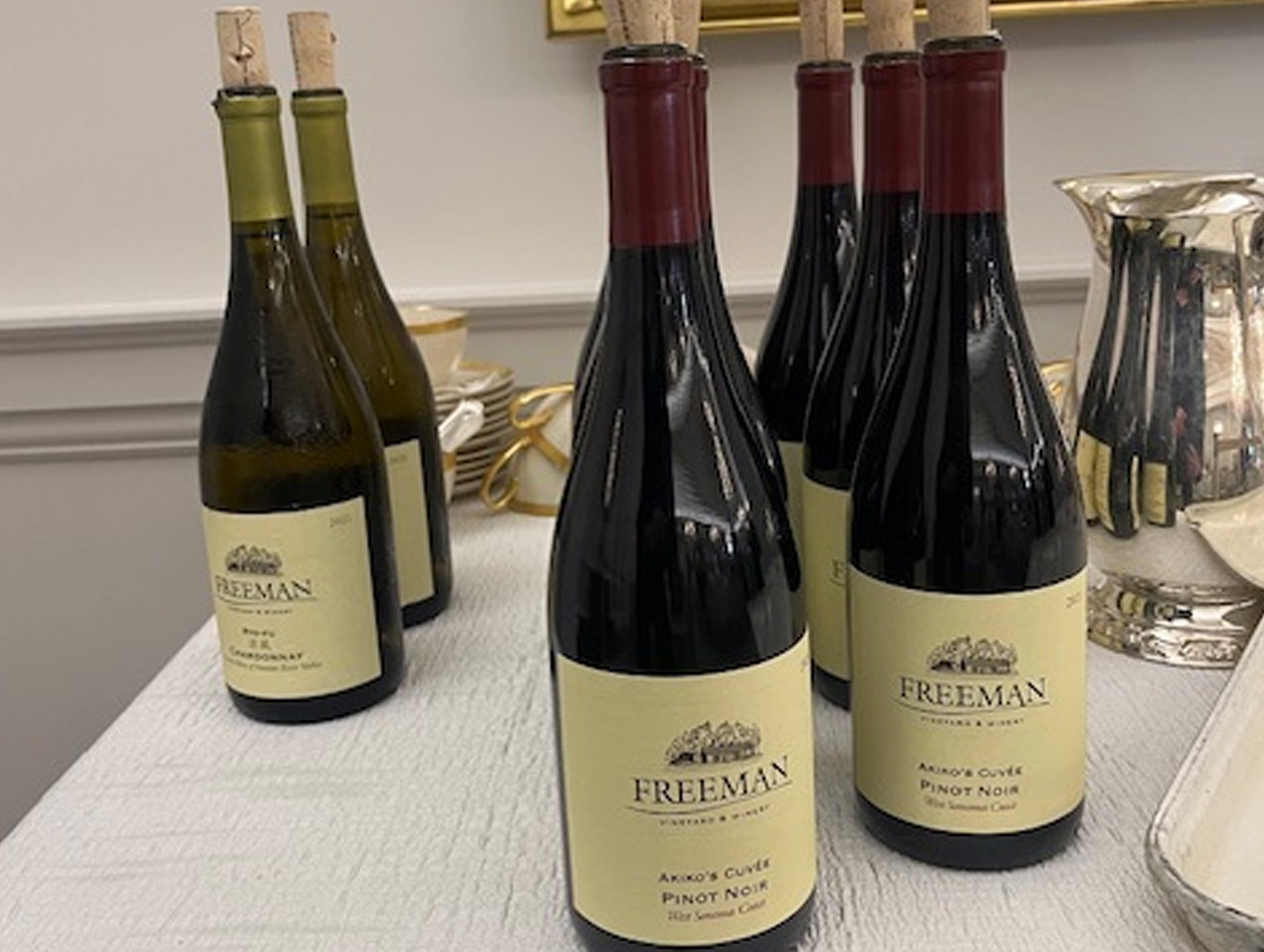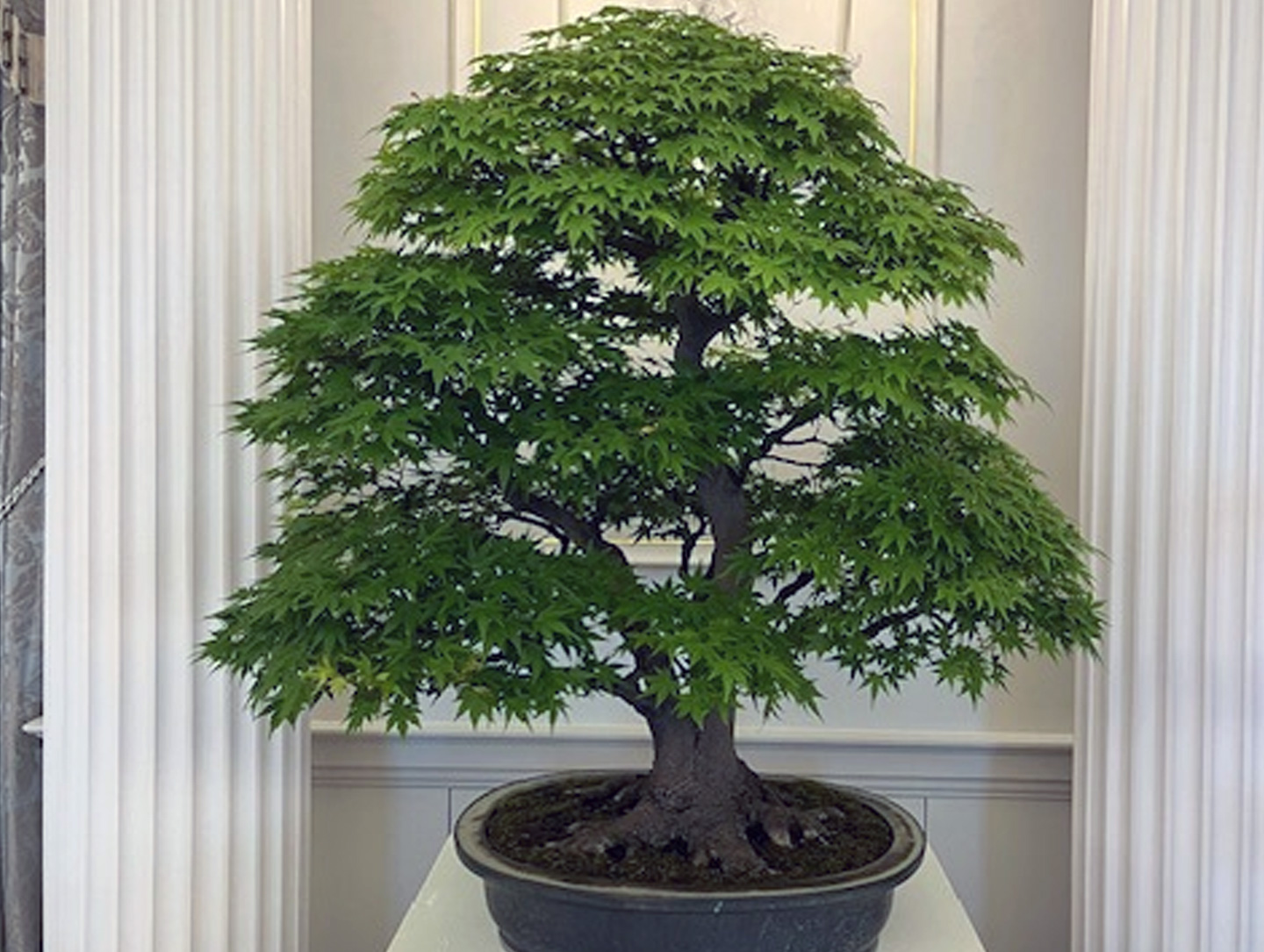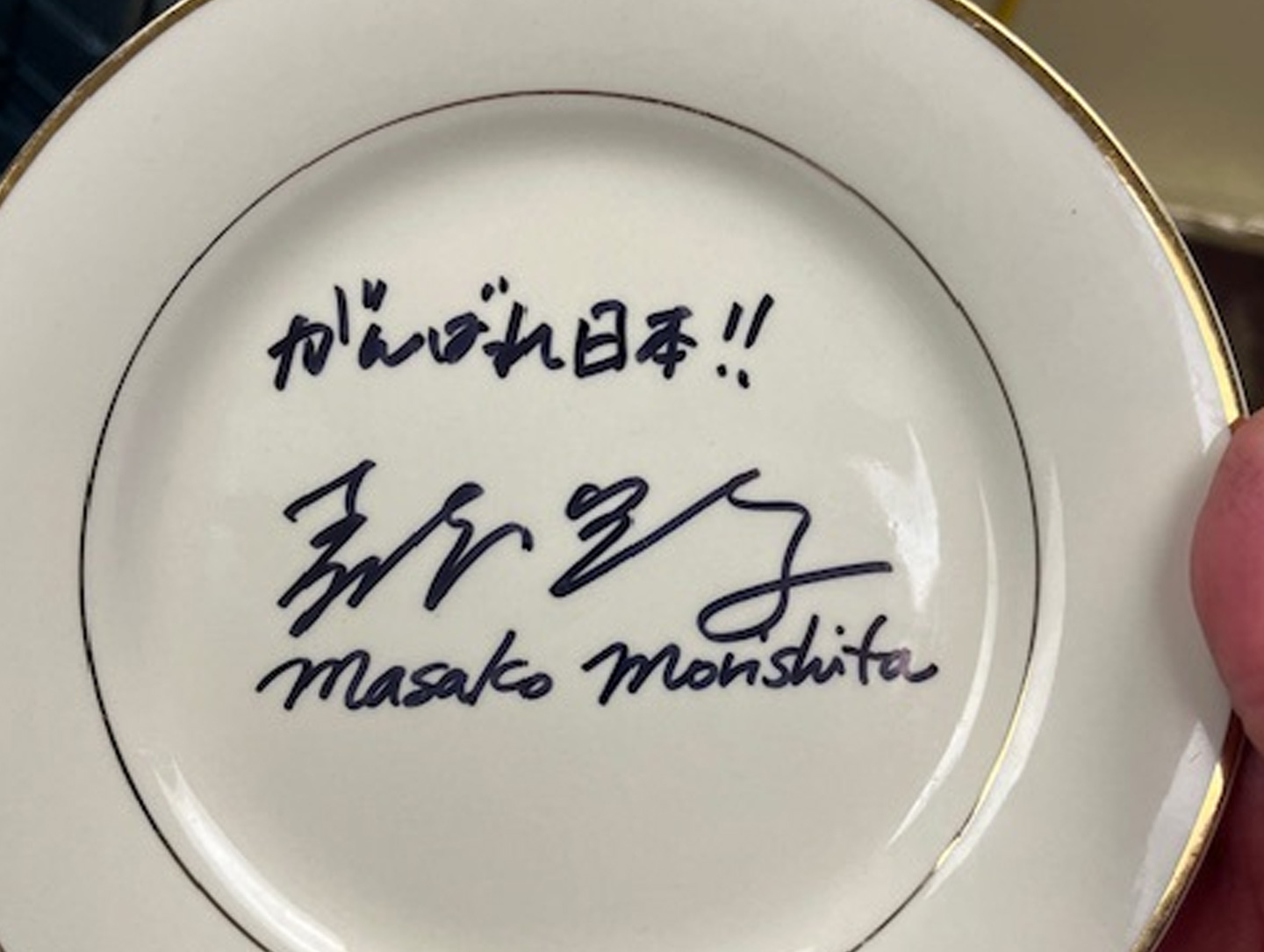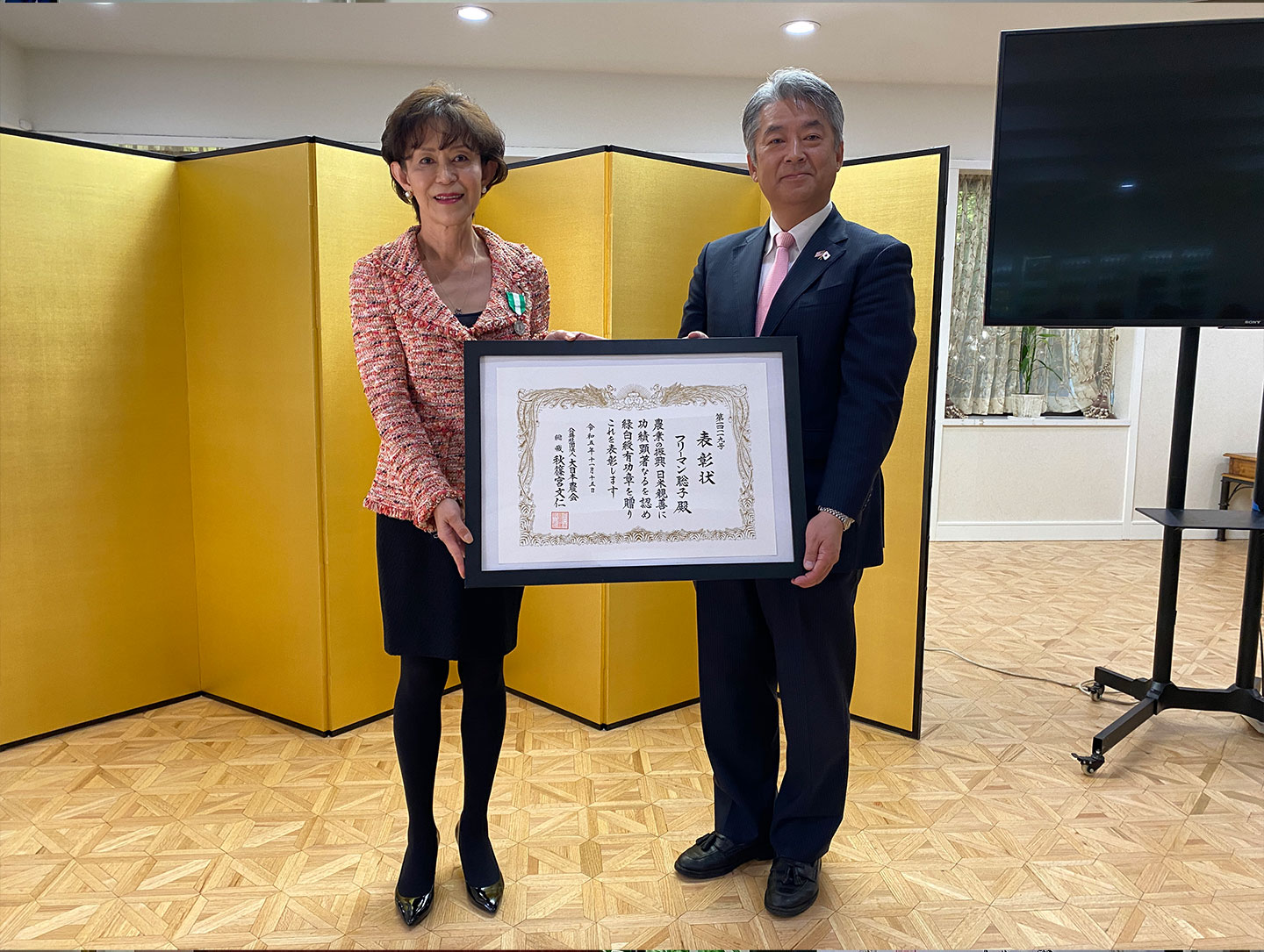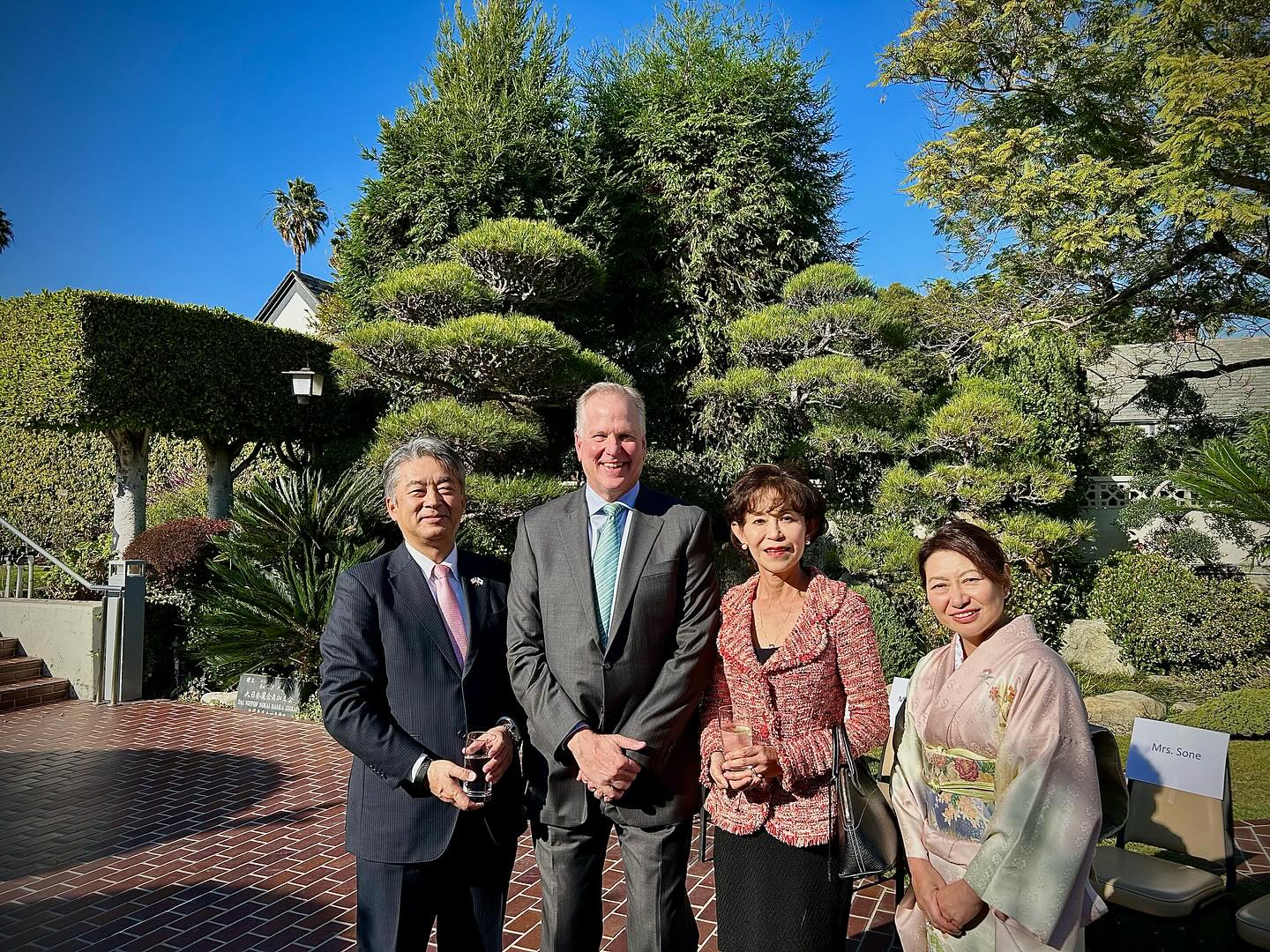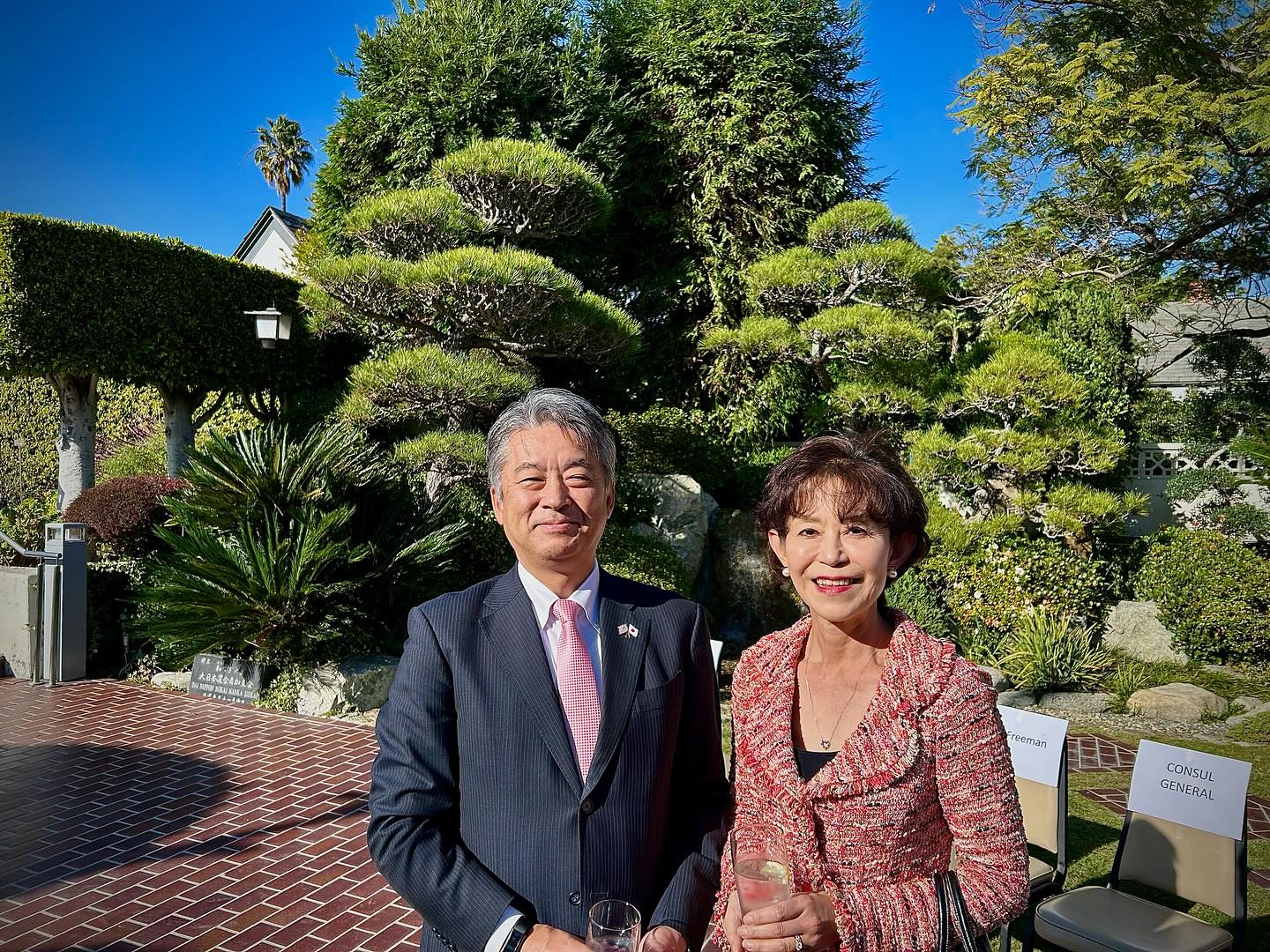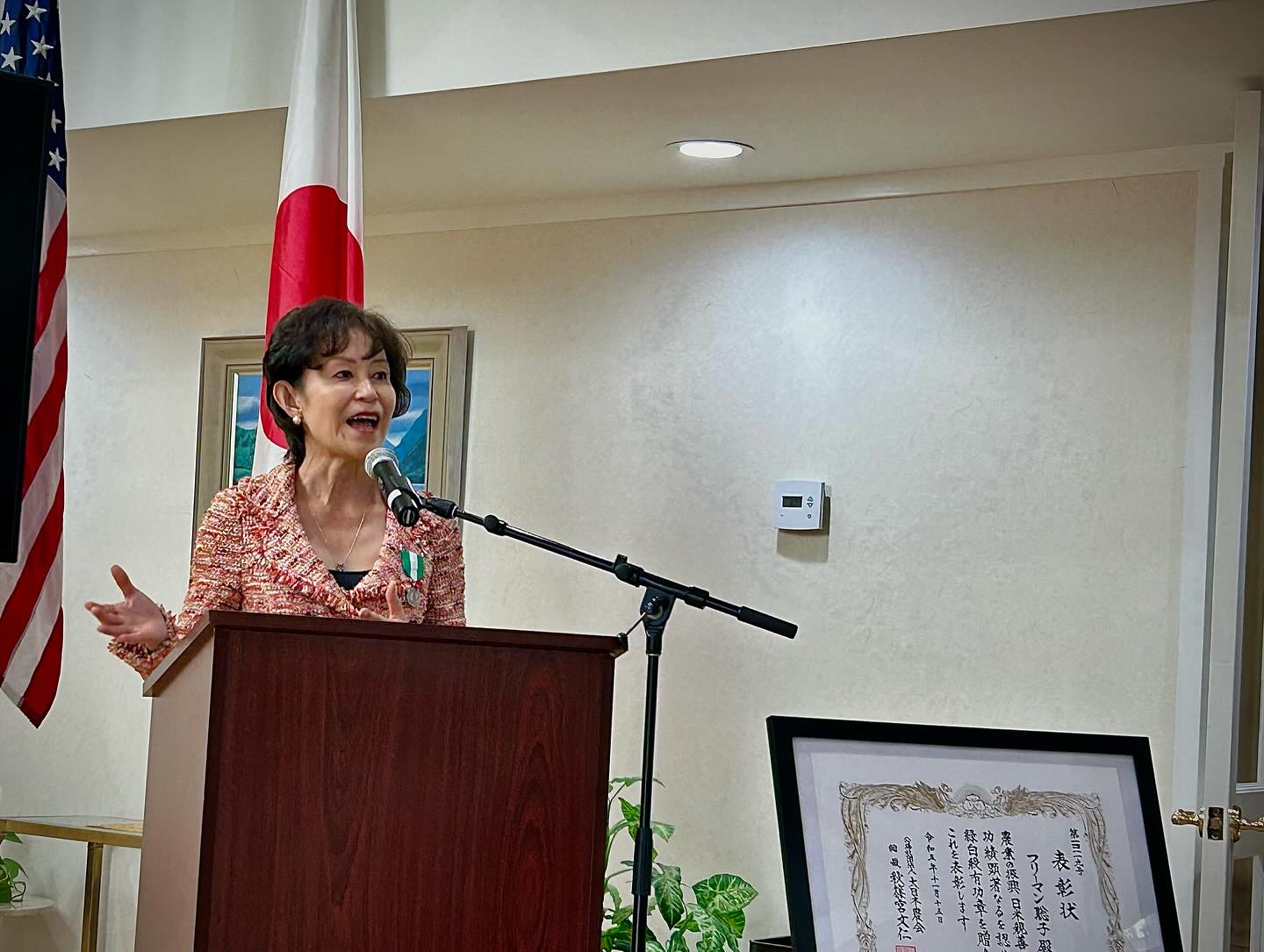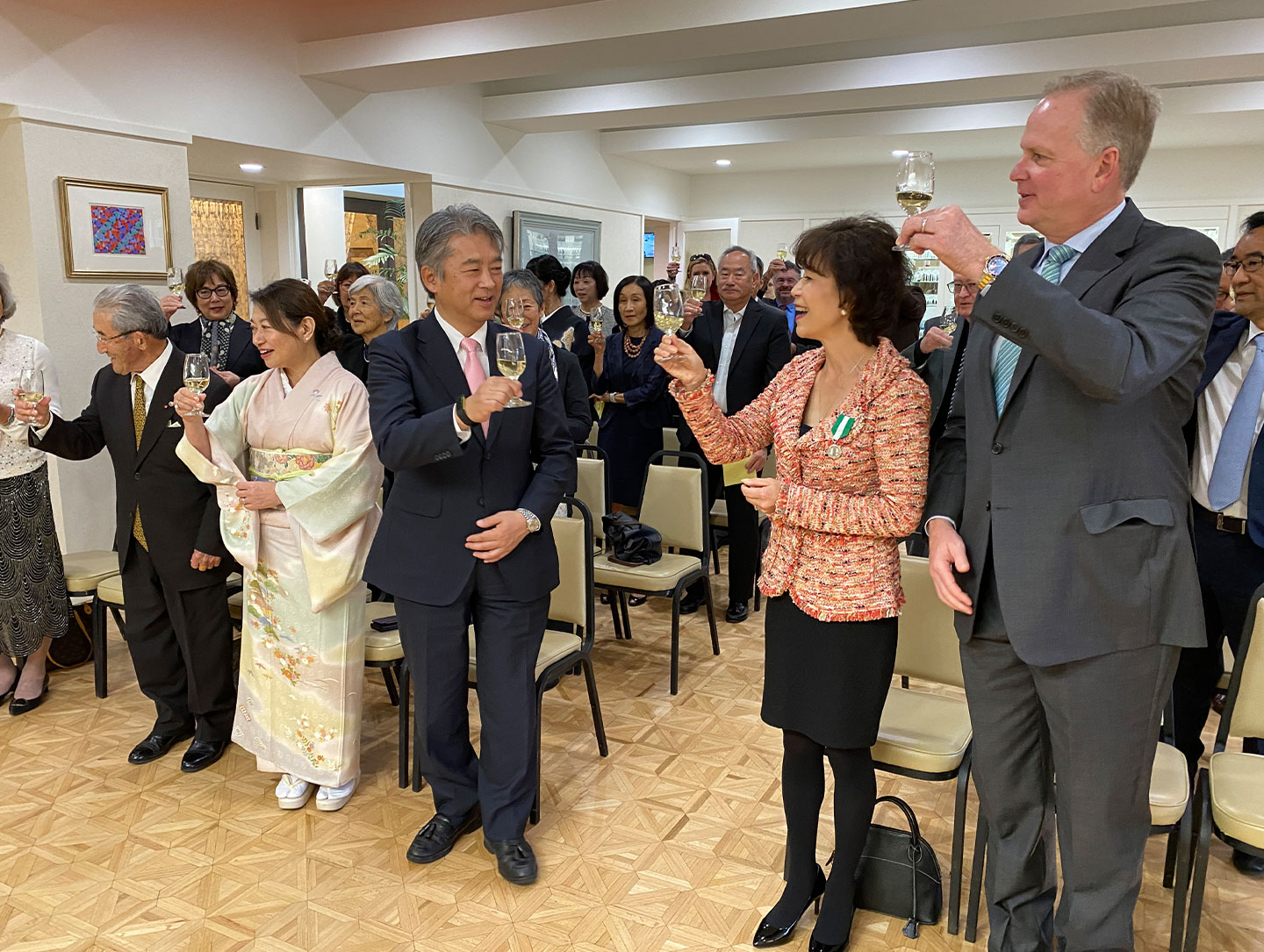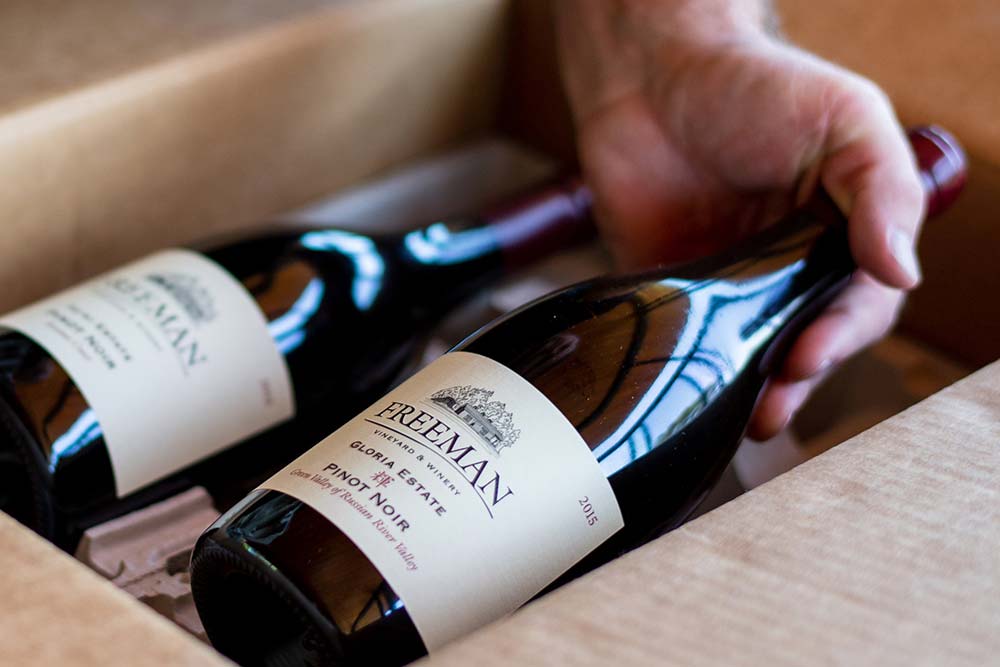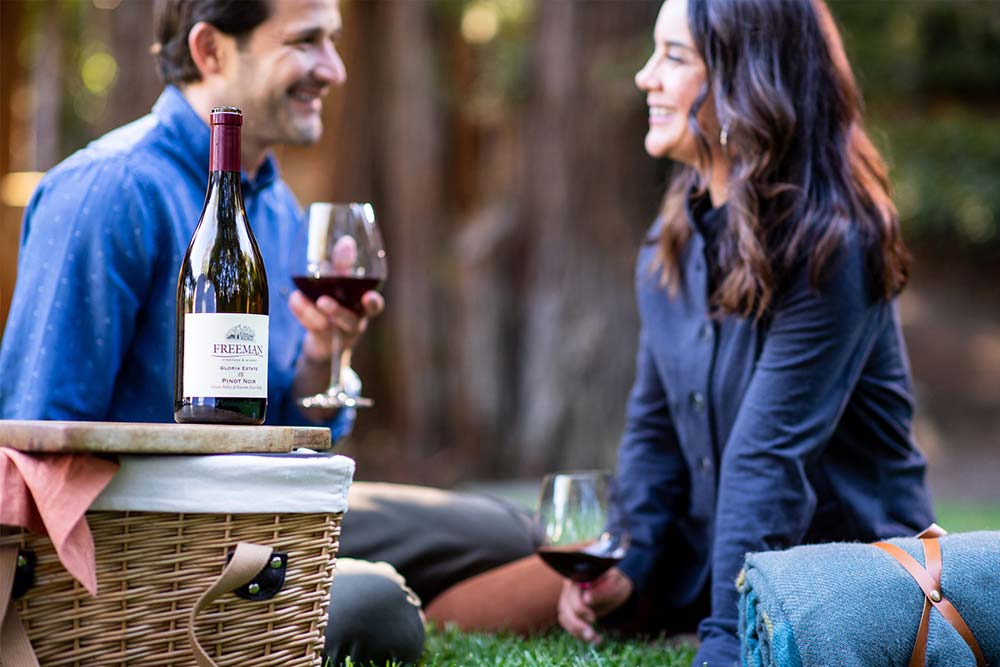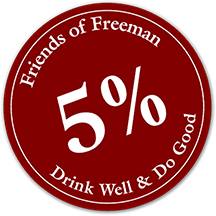Highlights
Toast to International Ties: Freeman Wines Featured at State Department
On Thursday, April 11, 2024, we had the honor of presenting our wines during a luncheon at the State Department, hosted by Vice President Kamala Harris to celebrate the visit of Prime Minister Fumio Kishida of Japan. Esteemed attendees included Secretary of Transportation Pete Buttigieg and Secretary of State Anthony Blinken.
Featured wines were the 2022 Ryo-Fu West Sonoma Coast Chardonnay and the 2021 Akiko's Cuvee West Sonoma Coast Pinot Noir, both of which paired exquisitely with the seasonal menu, enhancing the culinary experience.
This prestigious event was not only a profound honor but also a testament to the deep cultural ties between the United States and Japan. We are grateful for the opportunity to contribute to such a significant occasion and look forward to fostering further connections through our shared appreciation for fine wine.
Historic Award for Akiko Freeman: The Green & White Medal for Agricultural Excellence
Akiko Freeman was recently honored with the Green & White Medal for Agricultural Excellence, becoming the first woman ever to receive this prestigious accolade. The ceremony, held at the Japanese Consul General’s residence in Los Angeles, recognized her for being the first Japanese winemaker with a wine served at the White House and her transformative approach to organic farming. Shinkichki Koyama, who presented the award, said of Akiko, “She worked very hard to achieve the best growing conditions on the property — irrigation, ensuring that the soil was well-drained and well-oxygenated — all with the long-term vision to produce better grapes under organic farming protocols.” Her efforts have significantly contributed to the agriculture sector, reinforcing Japan-USA relations. This milestone achievement underscores Akiko's pioneering role in the field.

We are honored that the White House featured our Ryo-fu Chardonnay at a recent State Dinner welcoming Japanese Prime Minister Shinzo Abe to the United States.
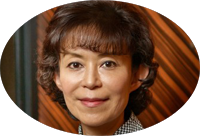
LE.PAN: The small Sonoma winery with Asian ambitions; “We don’t manipulate anything. We just try to grow the best fruit and bring out the best of it. That’s our philosophy.”
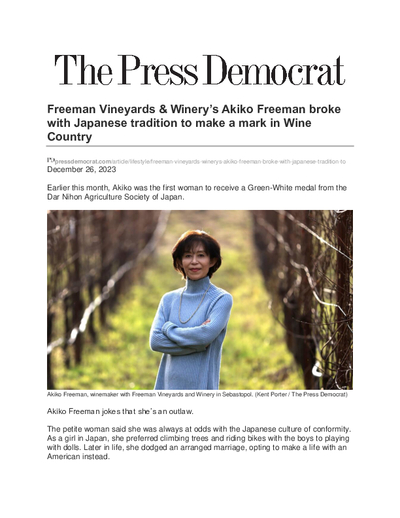
|
Press Democrat
Freeman Vineyards & Winery’s Akiko Freeman broke with Japanese tradition to make a mark in Wine Country
Earlier this month, Akiko was the first woman to receive a Green-White medal from the Dar Nihon Agriculture Society of Japan Akiko Freeman jokes that she’s an outlaw. The petite woman said she was always at odds with the Japanese culture of conformity. As a girl in Japan, she preferred climbing trees and riding bikes with the boys to playing with dolls. Later in life, she dodged an arranged marriage, opting to make a life with an American instead. In 1995, she married entrepreneur Ken Freeman, who had his sights on becoming a vintner. The duo founded their namesake winery — Freeman Vineyards & Winery — in Sebastopol in 2001. Akiko became the boots-on-the-ground winemaker in 2010 for the Freeman brand after apprenticing with winemaker Ed Kurtzman. By 2015, the Freemans saw their chardonnay served at the White House, at a state dinner for Prime Minister Shinzo Abe. Today the vintners’ label is one of the leading brands in Japan. Earlier this month, Akiko was the first woman to receive a Green-White medal from the Dar Nihon Agriculture Society of Japan. The Japanese government organization awards the Green-White medal to honor individuals who make an exceptional contribution to the agricultural industry. The criteria for American nominees is also that they foster goodwill between the United States and Japan. Generosity has long been a cornerstone of Freeman Vineyards, with the winery giving 5% of its wine club sales to charities, including the Asia Society, the Asian Cultural Council and the Japan Society. At a ceremony in Los Angeles, the organization lauded Akiko for her contribution to goodwill between the countries, her reputable label and her long-term vision for organic farming. “I’m glad people recognize me for what I’m doing,” Akiko said. “The wine world is so very male-dominated. And I hope because I got this award, it’s going to open the door and be an inspiration for young female winemakers. Like, if they hope to reach for a star, it can be done.” An unlikely marriage Akiko’s grandfather Yoshitaro Wakimura told her she and her parents would be written out of his will if she married “the foreigner.” To protect her parents, Akiko returned Ken’s engagement ring twice. But Ken was persistent. In 1995, he was working in Hong Kong, setting up networks across Asia for the Discovery Channel. He told Akiko, who was in Tokyo, “I’m coming for you.” As a somewhat isolated country, Japan wasn’t used to having foreigners intermarry, especially in the upper levels of society, Ken said. Akiko is a cousin of the former Empress Michiko. When Akiko told her mother Ken was on his way, she trusted the marriage was meant to be and encouraged her daughter to go with him. “I don’t know what magic my mother had, but somehow she made my grandfather understand that I needed to do this,” Akiko said. “And so it all worked out.” If she had followed Japanese tradition, Akiko said, she would have had an arranged marriage and become a housewife. “It turned out much better for me,” Akiko said. “I get to do what I love to do. Being a winemaker is very rewarding.” Independent thinker Although Akiko broke with tradition, she said, she still reveres her late grandfather. He imbued her with a love of travel and wine. In fact, she credits him for setting her on her path to be an independent thinker. Earlier generations of Akiko’s family lived in the small town of Tanabe, seven hours by train southwest of Tokyo. Their trade was forestry, but Akiko’s grandfather enrolled at Tokyo University in the 1930s. He was a star student and later traveled to England to study at Oxford University. After returning to Tokyo, he surprised many when he was chosen to be a professor of economics at the young age of 27. An expert on international energy and shipping, Wakimura warned the Japanese not to get into a war with the West. He was ultimately jailed for his bold statements for several years during World War II. When the war was over, Wakimura was tapped by U.S. General Douglas MacArthur to restructure Japan’s oil and shipping companies on behalf of the occupying forces. In his later years, Wakimura collected art. Today his pieces are showcased in an art museum in Tanabe. Inspired by her grandfather, Akiko also decided to study abroad. She came to the United States in 1985 and enrolled in New York’s Manhattanville College. Akiko first crossed paths with Ken at a party in Scarsdale, New York. While crewing a yacht on its way to the Caribbean, Ken was forced by Hurricane Gloria to head to a nearby port. He went to a friend’s party and when he saw Akiko in a Chanel dress, amid others in jeans and T-shirts, he was smitten. The date they met — Sept. 28, 1985 — is engraved in a keystone at the entrance to their wine cave. After nearly three decades of marriage, Akiko said she has no regrets about how her life has unfolded. Following her curiosity as though it were her compass, Akiko explored both art and wine in the mid-1990s. She studied at Stanford University and earned a master’s degree in Italian Renaissance art history in 1993. After that, Akiko traveled throughout Europe and as far as South Africa to explore the great winemaking regions of the world. Returning to California in 1997, Akiko and Ken began making plans to create their boutique winery. “My family thought I was trouble because I was always doing what I wanted to do,” Akiko said with a broad smile. “I always wanted to go on an adventure.” The White House In 2015, a man called Akiko at the winery, asking for 10 cases of wine for the White House. Akiko said she knew of White Castle restaurants but had never heard of a restaurant in the United States named the White House. When the man said he was calling from the actual White House in Washington, D.C., she laughed and hung up on him, thinking it was a prank. When the man called back and identified himself as Daniel Shanks, the White House sommelier, Akiko finally believed him. The wine Shanks purchased for the state dinner for Prime Minister Shinzo Abe was the Freeman, 2013 Ryo-fu Chardonnay. The award Being the first and only Japanese winemaker to have a wine served at the White House is one reason for her recent award, Akiko said. Another reason is her commitment to organic farming. Akiko was determined to transform several apple orchards that had been heavily treated with chemicals into organic vineyards on their winery property. Today she practices organic farming with every grape she grows. Shinkichki Koyama, who presented the award in Los Angeles, said of Akiko, “She worked very hard to achieve the best growing conditions on the property — irrigation, ensuring that the soil was well-drained and well-oxygenated — all with the long-term vision to produce better grapes under organic farming protocols.” Today Freeman Vineyards produces 5,000 to 6,000 cases of pinot noir and chardonnay a year. Ken jokes they don’t have plans to produce more wine because Akiko doesn’t want to work any harder. The biggest challenge in being a winemaker, Akiko said, is keeping up with the physical demands of the job. “I’m a small person, so (winemaking) is very hard for me,” she said. “The equipment with wine is so heavy, so I have a physical disadvantage. I’m light-weight. Just carrying around the hoses around the winery, they’re so heavy, so I have to build up my muscles.” But the winemaker, now 59, said she isn’t daunted by the physical tasks or the long hours required. During this past harvest, she worked 12 to 13 hours a day for two months. Akiko said she finds the magic of fermentation fascinating and loves the entire process of winemaking, from the vineyard to the cellar. “I was always the outlaw in my family,” Akiko said. "When I was growing up in Japan, girls should do this and boys should do that. And girls should never do what boys are doing. And now I get to do whatever I want.” |
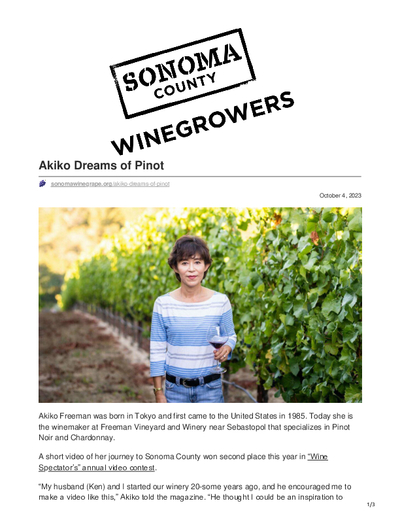
|
Sonoma County Winegrowers
Akiko Dreams of Pinot
Akiko Freeman was born in Tokyo and first came to the United States in 1985. Today she is the winemaker at Freeman Vineyard and Winery near Sebastopol that specializes in Pinot Noir and Chardonnay. A short video of her journey to Sonoma County won second place this year in “Wine Spectator’s” annual video contest. “My husband (Ken) and I started our winery 20-some years ago, and he encouraged me to make a video like this,” Akiko told the magazine. “He thought I could be an inspiration to younger women trying to pursue their dreams. When I was growing up, girls were not allowed to work outside of the family. I’m pretty much the only one who went ahead and worked outside of the household. It surprised everybody.” The two-minute video opens with Akiko speaking in Japanese, explaining as she lowers her nose into a barrel of wine that her grandmother was a master of Kodo, the art of defining incense by its fragrance. Also called “Way of Fragrance,” or “Way of Scent,” she believes that watching her grandmother has had an influence on her winemaking. “In Japan, kodo dates back more than 1,000 years when nobles in the Imperial Court would find poetic inspiration in ‘listening to the fragrance’ of aromatic woods,” explains Sonia Jackson Henrich about the subject in “Savvy Tokyo.” “This term was used to describe the pleasure and inspiration derived from breathing in scents of fine incense like one might enjoy fine wines or music.” As filming moves into the vineyard, you see Akiko assessing her Pinot grapes, saying she knows many people fantasize that owning and running a winery is quite glamorous. But in the West Sonoma Coast, it can be very challenging. She believes her job is to listen to the story told by the grapes about the land and everything that went on during the growing season and translate that story through the wine. Freeman was founded in 2001, 16 years after Ken and Akiko first met, serendipitously, at a party in New York, where Akiko was studying. Driven by the belief that California could produce beautiful cool-climate Pinot Noir and Chardonnay, they looked at more than 300 properties before choosing Sonoma County and the site where Freeman sits today. Having grown up in Tokyo, Akiko never imagined she’d be farming grapes and making wine in Sonoma County, but that she is living “a special dream.” While her grandmother’s Kodo may have led Akiko to her current path, she credits her grandfather for giving her the wine bug, especially for Pinot Noir and Chardonnay. A professor at Tokyo University passionate about French wine, he would often be given good bottles of wine from his students. But as she told the publication “Le Pan: The Art of Fine Wine Living,” in a 2015 interview, her grandfather was a Bordeaux drinker, “so all the great Burgundies went to my father, who always shared them with me. I learned to love Pinot Noir.” After that chance meeting in New York, Akiko figured out a way to stay in the United States near Ken, earning a master’s degree in Italian Renaissance art history from Stanford while he was working in San Francisco. They’d come up often to visit wineries. They then traveled widely through Europe and South Africa exploring the world’s winemaking regions before returning to the Bay Area in 1997. Akiko learned alongside Freeman’s founding winemaker Ed Kurtzman, who is still an integral part of the winery’s team, Akiko serving as his apprentice before taking the reins in 2010. She now oversees both the estate vineyards, centered around its 8-acre Gloria Estate Vineyard, relationships with other growers and winemaking. In addition to Gloria, Freeman farms the 14-acre Yu-ki Vineyard on the Sonoma Coast, six miles from the ocean established at 1,200-feet elevation. Yu-ki means “big trees.” There are many diverse stories of how people get into winemaking, winegrowing and find their way to Sonoma County. Akiko’s might be the only one threaded to a tradition dating back 1,000 years. |
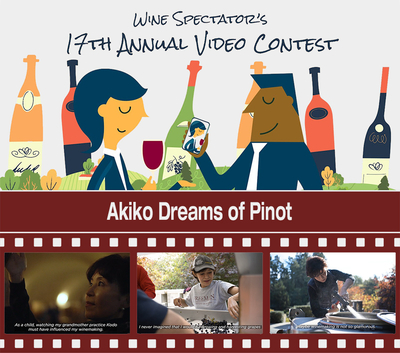
|
Wine Spectator
"Akiko Dreams of Pinot" Finalist in Wine Spectator's Video Contest
September 2023
For our 2023 video contest, our finalists shared their tales about their love of wine—what it means to them, how they enjoy it, celebrate it and even commit their lives to it. (A big thank you to every entrant for sending us their stories, from the heartfelt to the humorous.) Get ready to laugh, recognize a bit of yourself and be inspired! 2nd Place: Akiko Dreams of Pinot The story of Akiko Freeman’s journey from Japanese exchange student to West Sonoma Coast winemaker. Akiko learned the art of Kodo from her grandmother and uses that experience to translate the message of the vineyard through the expressive wines she makes. |
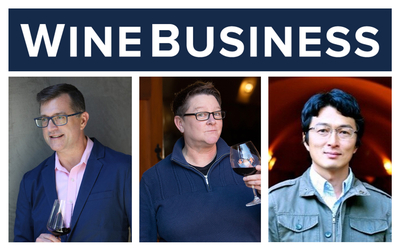
|
Wine Business
Freeman Vineyard & Winery Announces Three Additions to the Winery Team
SEBASTOPOL, Calif., (Sept. 25, 2023) Freeman Vineyard & Winery owners Akiko and Ken Freeman announce the addition of three new members to the winery’s staff. They are:
“Bringing Kevin, Dar and Eiji into the family gives us a world-class team to represent and match the caliber of our wines,” says proprietor Ken Freeman. “We are welcoming many more visitors to the winery than we have in the past and our sales continue to increase at a steady pace. With this strategic expansion to our team we’ll be able to continue to provide hands-on attention to our winemaking while making our visitor experience even better.” Adds Winemaker Akiko Freeman, “We’ve taken great pride in our ability to grow our business organically over the years. Finding the right fit is important, because we’ll be able to transition with the times quite easily.” Kevin Hinchman, Brand Manager Kevin Hinchman Hinchman’s responsibility as Brand Manager encompasses just about every aspect of the winery. He works with Ken Freeman in the national distribution arena, sets pricing, and serves as the face of Freeman Vineyard & Winery when Ken and Akiko are unable to attend events in far-away markets. Based in Napa, the longtime wine pro has held key regional and national sales positions with TOR Wines, Cliff Lede Vineyards, and Patz & Hall. Dar Cluster, Director of Hospitality Dar Cluster, the winery’s new Director of Hospitality was Operations Manager at Flowers Winery before joining Freeman. The Monte Rio resident oversees winery visits, charity and corporate events, and wine club functions. “I was already a member of the Freeman wine club, so when a tasting room position opened up here, it was a perfect blend of my passion for the wine business and my passion for Freeman wines. Visitors here appreciate our low-key approach. We talk one-on-one about the wines, the amazing setting, and about the people. We have conversations with our visitors, not lectures or sales pitches.” Eiji Akaboshi, Associate Winemaker Eiji Akaboshi Akaboshi comes to Freeman as Associate Winemaker after working at Peju Winery, Green & Red Vineyards, and Rombauer Vineyards in Napa Valley, as well as Medlock Ames in Alexander Valley. Since graduating with a master’s degree in enology from Fresno State, Akaboshi has had what he calls “a circuitous career,” in which he’s “seen everything, done everything, and worked all over, learning all I could about winemaking and the wine industry.” When he first tasted Freeman wines a decade ago, he adds, “I loved Akiko’s wines and their elegant style, and I’d always wanted to work with Sonoma Pinot Noir. Now it’s like I’m fulfilling my dreams.” On a historical note, Akaboshi is the great-great-grandson of winemaker Nagasawa Kanae, a Japanese native who emigrated to Sonoma County in the 1800s and became known as the “Wine King of California.” By the turn of the 19th century, he ran one of the state’s largest and most influential wineries at Fountain Grove Winery in Santa Rosa. Eiji takes a lot of pride in carrying on the family wine tradition, despite the gap of five generations. |
|
Wine Business
Freeman Winery Visit Interview
Convey what the soil and grapes went through with a bottle of wine... If you drive through the thick fog covering Golden Gate Bridge, blue skies and sunshine greet you like it was all a dream. Drive 50 more miles north on highway 101, and you will find Freeman Winery, the ‘Little Bourgogne’ in the small city of Sebastopol, Sonoma County. There was some traffic with everyone driving home from work, but it was bearable thanks to my rental Tesla’s Autosteer option. The founders of Freeman Winery, Ken and Akiko Freeman, met through a hurricane, both figuratively and literally. With the recommendation of her principal at the all-girls Catholic highschool in Japan, Akiko decided to go as an exchange student to Manhattanville College, a sister school in the U.S. The name misled Akiko to believe that the college was located in NYC (it had been, when it was founded), but when the taxi she rode from the airport dropped her off 30 miles away in Purchase, Westchester County, she was taken by surprise. One day, a huge hurricane hit the State of NY (and other parts of the U.S.), causing a power outage in the area, including Akiko’s dorm. Sitting around with nothing to do in her dark room, Akiko was invited to go to something called a ‘keg party’, which was being held by her friend’s boyfriend and his friends. For her first party in the United States, Akiko dressed to the nines like Audrey Hepburn would in the movies. She would only find out what a keg party was after arriving there. Meanwhile Ken, who had been sailing a yacht with his friends in the Atlantic, had to take shelter during the hurricane and went to the same keg party held by his friends. He found Akiko, elegantly dressed and beautiful, standing out amidst the rowdy college crowd of the keg party. It was love at first sight, and the rest is history, as they say. They continued their long distance relationship until they got married in San Francisco, and in 2001, acquired the winery here and started making wine. Ken’s day job is in finance and Akiko majored in art history of the Italian Renaissance, earning a master’s degree in Stanford. They originally hired a professional winemaker for the wines from 2001 to 2009, during which Akiko worked next to him as an apprentice doing every task imaginable, however meager or difficult. One day in 2009, the winemaker, who is a good friend to the founders to this day, told Akiko that ‘now you are able to make wine completely on your own’, and left, putting Akiko in charge of everything. Ken and Akiko subsequently sold their house in San Francisco and built their estate in the winery to live there, and Akiko has been a full-time winemaker ever since. “As a winemaker, I think of myself as a translator of nature. Wine is a story of what happened in nature during that year. A bottle of wine contains the entire tale of whether the weather was hot or cold, if it was windy, whether it was rainy or there was a draught, if there was plenty of sunshine, what the soil and grapes had to go through. I try to translate nature’s story as truthfully possible, as it was.” (Akiko) “To convey the story as it actually happened, we interfere as little as possible. A minimalistic approach.” (Ken) They planted pinot noir clones flown directly from the Bourgogne area in France in the vineyard named after the hurricane that helped them meet, Gloria Estate Vineyard. They grew the sensitive and delicate-skinned grapes with great care, using organic and biodynamic farming methods. The Sonoma area where Gloria Estate is located, had traditionally grown apple trees, until large grocery chains started taking over the U.S. The type of apples produced here were very delicious, but had a very short shelf life leading to their dismissal by the large supermarkets. As a result almost all of the apple orchards were replaced by vineyards. I found out during this interview that apple farming is notorious for using a lot of pesticides and other chemicals, and it takes about 7 years for the soils to detoxify and become free from their effects. Freeman Winery has another vineyard in Russian River Valley called KR Ranch. Among Freeman’s Pinot Noirs KR Ranch and Akiko’s Cuvee are my favorite. Both are minty, herby and very elegant. A light touch of French oak lends flavor yet keeps the daintiness intact. It is like it was made just for me, usually having a bit difficulty with other strong character U.S. wines. Closing my eyes and taking a sip, I listen to the story of nature as translated by Akiko, very earnest and clear, of the strong and bright sun in contrast with the coolness brought by the hills, the sea winds from the Pacific, the life story of the wine grown with love and care in Freeman Winery. When I open my eyes, I am already there. |
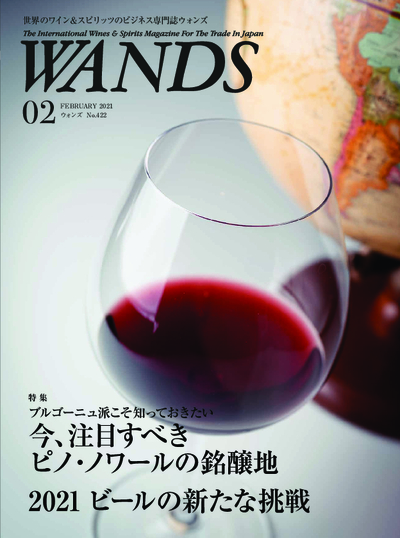
|
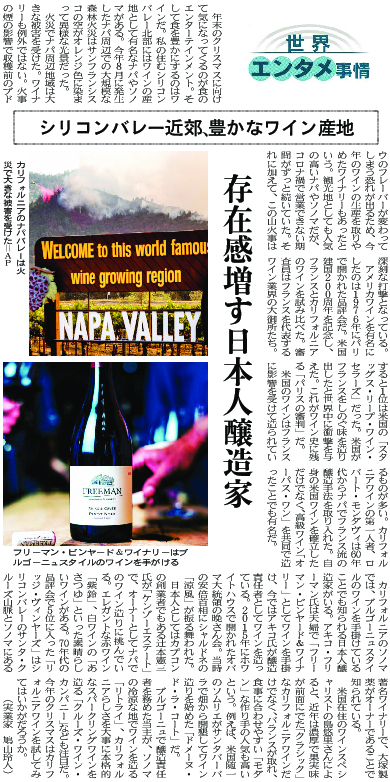
|
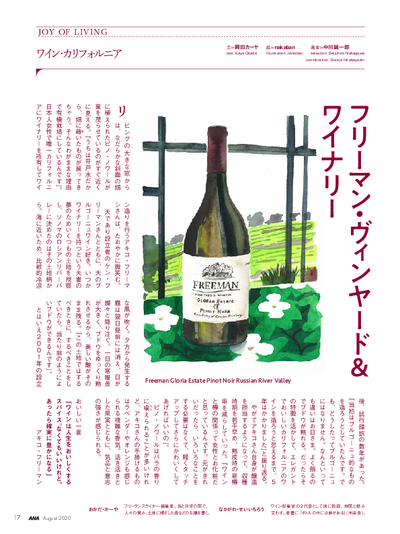
|
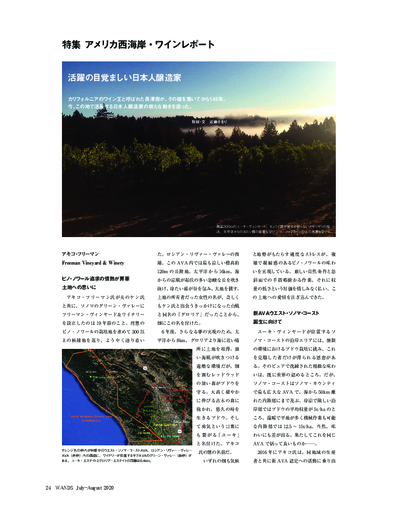
|

